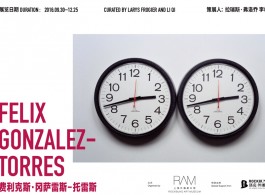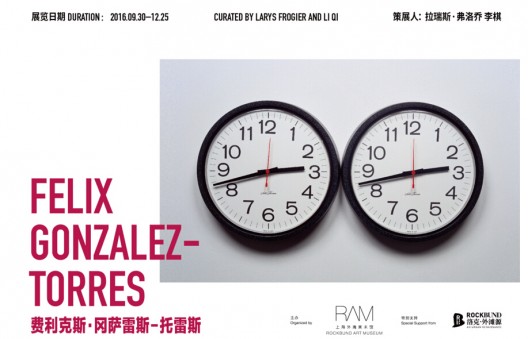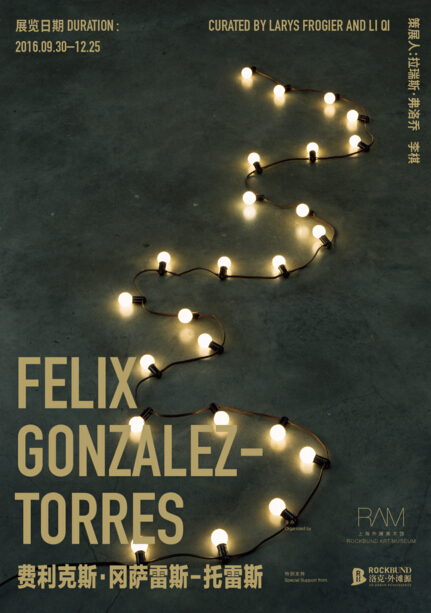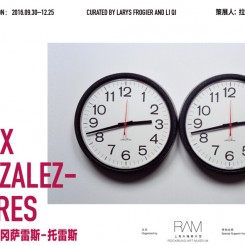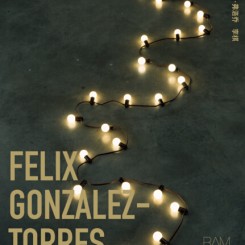The Rockbund Art Museum is honored to present the first solo exhibition of the influential international artist Felix Gonzalez-Torres (1957-1996) in Greater China. From September 30th to December 25th, 2016, RAM will host a comprehensive exhibition of work by the late American artist, who is renowned for his unconventional methodology and poignant sensitivity. The unique nature of his work takes this exhibition beyond a retrospective; it constitutes a genuine renewal of his art.
Selected from 30 institutions and collections across the world, the exhibition includes over 40 pieces, spanning from 1987 to 1994, invites audiences to contemplate issues, both public and private, that are still relevant today. Throughout his work, the tension between the public and private, the shared and the personal, comprises a recurrent theme for Gonzalez-Torres. Many of the artist’s works consist of everyday objects, such as strings of light bulbs, mirrors, wall clocks or printed sheets of paper. Other works are comprised of spills of candy , mirrors, and jigsaw puzzles. His artwork itself is like a puzzle, but lacking a univocal order. Its demure minimal aesthetic solicits the audience to put the pieces together for themselves, inviting a plurality of pictures to emerge.
One of the most intriguing aspects of this exhibition is the dramatic shift in the historical and cultural context of the artworks as they travel to Shanghai. Much of Gonzalez-Torres’ work allows the environment to challenge and alter its aesthetic. By staging the exhibition in contemporary China, it will open up the artist’s work to a new context, as a 21st century Chinese public confronts its message for the first time. It is well known that Gonzalez-Torres produced his work in the 80′s and 90′s in an American society and art community profoundly affected by the AIDS epidemic. However, it would be a mistake to engage with his work as simply dealing with homosexual issues or the AIDS crisis. These issues represent that circumstances under which the work were made and can be understood as platforms for exploring human values, relationships and aspirations at large, both in the artist and in the viewer.
Audiences in China may readily recognize a postmodern symptomatology in the artworks on show; a presentation for an age of information where social media, television and the internet fragment identities and abrogate local bonds. By the late 1990’s, the Chinese art community had already recognized the value of Gonzalez-Torres’ contribution in the domain of identity politics. His peculiarly subtle way of navigating this sphere served as a model for many. Yet, sometimes this dimension of his artwork dominated its appreciation, obfuscating some of its more pliable and generalizable aspects.
Broad social themes resonate throughout the exhibition including: the conditions of large-scale production, dominant discourses, minority representation, or the loss of personality in the currents of postindustrial society. Equally the experience of loss, of love, the uncanny passage of time, or the hopeful quality of play— the very conditions of life—can also be found in this artist’s extraordinary array of work.
20 years since his passing, RAM is able to present the work of Felix Gonzalez-Torres afresh, moving beyond the labels that once constrained its definition. Its uniquely interactive nature entails that meaning is not only discovered, but also contributed by its audience. This reciprocity is what makes Gonzalez-Torres both an artist of the polity, and in the end altogether intimate. Quirky and opaque, sharp and humorous: the pieces presented in this forthcoming exhibition will incite introspection just as they draw its audiences together.
Rockbund Art Museum would like to thank the Felix Gonzalez-Torres Foundation and the many institutions that graciously loaned their pieces, both for their generous help and their assistance in bringing this exhibition into realization.
About the Artist
Gonzalez-Torres’s interest in social and political causes may have informed the overlap of private and public life that can be found in his work. From 1987 to 1991, he was part of Group Material, a New York based art collective whose members worked collaboratively to initiate community education and cultural activism.
During his lifetime, Felix Gonzalez-Torres (1957-1996) was the subject of several important museum exhibitions, including “Felix Gonzalez-Torres: Traveling” (1994) at the Museum of Contemporary Art, Los Angeles, the Hirshhorn Museum and Sculpture Garden, Smithsonian Institution, Washington D.C. and The Renaissance Society at the University of Chicago, and a retrospective organized by the Solomon R. Guggenheim Museum, New York (1995), which traveled to the Centro Galego de Arte Contemporánea, Santiago de Compostela, and ARC-Musée d’Art Moderne de la Ville de Paris.
Gonzalez-Torres’s works have been included in hundreds of group shows, including early presentations at Artist’s Space and White Columns in New York City (1987 and 1988 respectively); the Whitney Biennial (1991); the Venice Biennale (Aperto 93, 1993); SITE/Santa Fe (1995); and the Sydney Biennale (1996). Since his death in 1996, there have been numerous solo exhibitions devoted to his work, including ones organized by the Sprengel Museum Hannover, Germany (1997) which traveled to Kunstverein St. Gallen Kunstmuseum, Switzerland (1997) and Museum fur Moderne Kunst Stiftung Ludwig Wien, Austria (1998); the Serpentine Gallery, London (2000); Hamburger Bahnhof-Museum für Gegenwart, Berlin, Germany (2006 – 2007); PLATEAU and Leeum, Samsung Museum of Art, Seoul, Korea (2012). A survey of his work, ‘Specific Objects without Specific Form’, was organised by WIELS, Centre d’Art Contemporain, Brussels, Belgium (2010), and then travelled to Fondation Beyeler, Basel, Switzerland (2010) and Museum für Moderne Kunst Frankfurt am Main, Frankfurt, Germany (2011). In 2007, Gonzalez-Torres was selected to represent the United States at the 52nd La Biennale de Venezia, in the exhibition “Felix Gonzalez-Torres: America”.
About the Curator
Larys Frogier is the Director of the Rockbund Art Museum (RAM) in Shanghai. Curator, critic and art historian, he is involved in artistic and social challenges in post-global contexts where ongoing social, economical, cultural transformations demand new ways of interrelations, citizenship and reinvented creativity.
He curated numerous exhibitions and published extensive essays on the works of international artists: Adel Abdessemed, Nan Goldin, Felix Gonzalez-Torres, Paola Pivi, Ugo Rondinone, Wang Du, Yang Jiechang.
Previously the Director of the contemporary art centre La Criée in Rennes (France), he curated long-term projects (symposiums, residencies, exhibitions, publications) which question the links and ruptures between broadening transcontinental areas. Chair of the HUGO BOSS ASIA ART jury since 2013 at the Rockbund Art Museum, he is conceiving this new award, exhibition and research program as an evolving platform to promote emerging artists and to question Asia as a construction to investigate rather than a monolithic area or fixed identities.
Larys Frogier taught art theory, history of art and curatorial studies at the University of Rennes, while he was also researcher at the École des Hautes Études en Sciences Sociales (EHESS) and at the Archives for Art Criticism.
Li Qi is Senior Curator at Rockbund Art Museum, Shanghai. He was Opinions Editor at The Art Newspaper China and Senior Editor at LEAP, where he currently serves as a contributing editor. He was a jury member of the 2015 Hugo Boss Asia Art Award for Emerging Asian Artists. In 2014, Li Qi curated “CONDITIONS: An Exhibition of Queer Art”, at club Destination, Beijing. In 2016, he curated “Heman Chong: Ifs, Ands, or Buts” at Rockbund Art Museum in Shanghai. Li Qi graduated from Beijing’s Central Academy of Fine Arts (CAFA), and from London’s Chelsea College of Art and Design. He has worked at institutions such as the Ullens Center for Contemporary Art (UCCA) in Beijing and the British Film Institute (BFI) in London.

